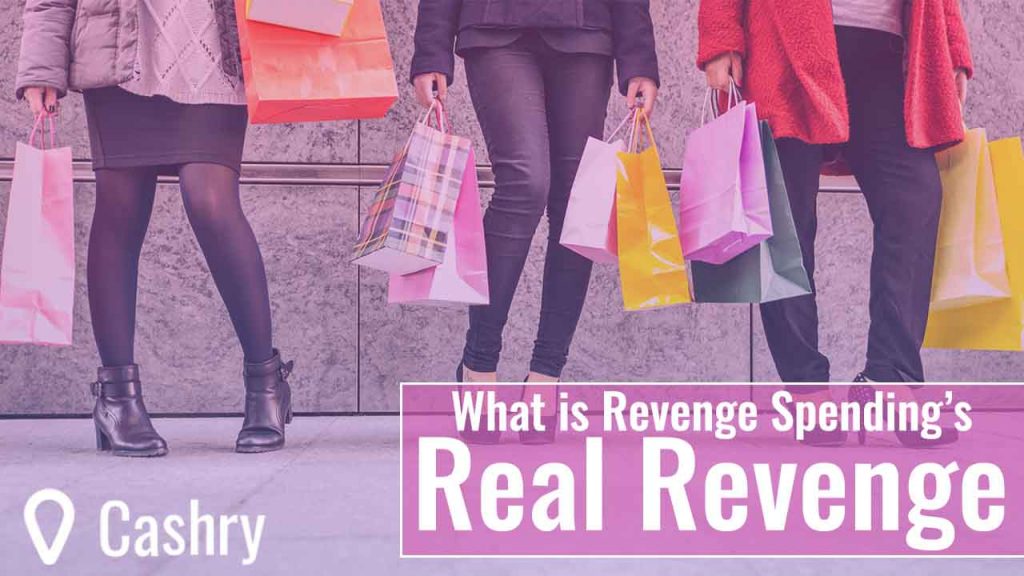What is Revenge Spending’s Real Revenge?

Revenge spending has such an evil sound to it. You might think it’s what you do to take things out on a former spouse, an ex-significant other, or your parents when they’ve put you on restriction for a while and it ends. Nope. The only person you hurt by revenge spending is yourself.
What is Revenge Spending?
Whenever an individual must adhere to a strict budget or must forgo spending for an extended period, there’s a chance they’ll revert to revenge spending when the time period ends. They’re getting back at the non-spending period ostensibly, but only hurting themselves and their own finances.
It most frequently happens when an individual saves up for a big expense like college tuition or a down payment for a car or house. You forgo spending on little things you would normally have purchased, so you can more quickly build your savings account. Once you make the purchase, you swing the financial pendulum in the opposite direction, suddenly going on a spending spree to “make up for lost time and fun.” Often, you overspend and eradicate all the good you did during the frugal months.
Why This Revenge Spending Article, Now?
Revenge spending typically isn’t a massive problem. It usually occurs spottily because not every person has to save money all at one time. However, we were all forced into a frugal period from March 2020 until approximately July or August of 2021 due to COVID-19.
The pandemic sequestered the majority of most countries of the world. With no movement and no going out and no shopping except via e-commerce for a year and a half, many people saved lots of money. Those fat bank accounts started suffering, though just as soon as people could once again move about the country freely.
COVID-19 has caused a tidal wave of revenge spending among those whose incomes didn’t change during the pandemic. Now that the country has largely been vaccinated and we reached herd immunity with the first children born naturally immune to the disease, bank accounts started to dwindle.
That’s not good.
If we can find any good in the pandemic, it is that many people who previously had no savings, built a small savings account out of the emergency funding provided by the government. Because they were receiving unemployment, these people could save the supplementary funds the government issued. That gave them a savings account for the first time in years, sometimes in their whole life.
Others didn’t lose their jobs due to the pandemic. Their work went on remotely and they also built bank accounts because they had nothing to spend their money on since everything closed.
What Do We Revenge Spend On?
People spend money on big-ticket items. Now that the sequestering ended, vacations have become people’s favorite big-ticket item. Airlines reduced fares to lure people onto planes. Cruise lines happily launched their ships.
Experiences top the list of revenge items. We’re beyond ready to “go do things” and many individuals have money flying out of their bank accounts into the coffers of travel agencies, hotels, restaurants, cruises, and other travel-related companies. There’s nothing tangible to return when we experience buyer’s remorse and even if we could return something, most shoppers don’t want to do so.
Others started shopping for things they desired but couldn’t purchase, such as vehicles. Some folks started renovating their homes or building additions. That’s something the pandemic had eradicated, since you couldn’t have work crews visit your home unless it involved an emergency service, such as a burst pipe that cut off your water supply.
Jewelry, furnishings, and recreational equipment round out the tangible items involved in revenge spending. We might not need them, but as a country, we’ve been buying them.
Psychologically, this pacifies the individual. It lets them have something they denied themselves for some time. In many cases, pandemic-wise, that means they’re trying to make up for lost time all at once. They can’t turn back time, but they want to spend time having fun. Of course, when the money runs out, there’s no more fun and there’s no more money.
How to Avoid Revenge Spending
Once you’ve read this, you know what to expect. That means you can plan ahead, so you avoid revenge spending and doing what others have done. Instead of allowing yourself to unwittingly fall into revenge spending patterns, you avoid it. You make a plan and stick to it. Here’s how to do that.
1. Study Your 2019 and 2020 Spending Patterns
Looking at your 2019 records reminds you of your normal spending. The year before coronavirus changed our lifestyles temporarily. It can help you understand what and how you should be spending. Comparing this with your 2020 spending lets you see how your normal spending got affected. You should go back to your 2019 spending only if it best served your finances.
2. Consider the Lifestyle Changes You Made During 2020
In some ways, we made positive changes due to COVID-19. Some people started working out more. Others opened a side gig business or took on remote work. Some families instituted a night they spent together doing at-home activities. This saved money and improved the individual’s or family’s lifestyle. It improved their self-care and helped address many mental health issues such as depression and anxiety. Exercise, such as riding a bike or running, proved to help the most.
3. Budget Your Fun Fund
No one’s saying, “Don’t spend money.” Instead, budget your fun. Looking at your 2019 spending, what aren’t you going back to doing? Did you drop your gym membership for running outdoors? You can re-allocate that saved money for fun of another type. Perhaps you’d enjoy catching up on new release movies. That money can buy you a movie ticket and popcorn each week to catch up on flicks in the theater. Maybe you’d prefer tangible items like some new clothes. Make a list of the items you want and prioritize them. Instead of buying them all at once, purchase them on a budget, so you don’t spend down all of your savings at once.
4. Plan Your Vacation for Specificity
Instead of just lighting off into the wild blue yonder, as my daddy would have said, plan where you most want to go and shop around for a great deal on that trip. A last-minute flight deal or cheap luxury hotel isn’t worth the expense if it isn’t where you really want to go. Plan the trip you really want instead of picking up a few that you aren’t really that into the location.
5. Create a Spending Cap
One area of expense, live music, could tap you out quickly. It’s been years, literally, since you probably attended a live show. They have held concerts or festivals and suddenly, you can go! Major concert tours returned and whether you listen to country music, such as Toby Keith, or rap music, such as Lil Wayne, you can attend live shows again because they’re on tour! You also need to know that concerts now command higher ticket prices. That’s to make up for reduced venue capacity requirements at some tour stops. You should cap your expenses by capping the amount you will willingly pay for a concert ticket.
This means you might miss some shows or forgo a show in one month to afford a more expensive ticket for another month. You still get to attend the live shows that really matter to you, and you avoid overspending. The same is true of major sporting events. Some sports can only accommodate 10 percent of their capacity levels. Therefore, ticket rarity caused prices to skyrocket.
6. Control Your Emotions
Be your own emotional rescue. Know yourself. You need the discipline to avoid revenge spending but still return to your normal spending patterns. Force yourself to stop before using your bank or credit card. Ask yourself whether the purchase fills an emotional need or a tangible need. Answer honestly. You might want to fill the emotional need of time with friends, but you could do it with a girls’ or guys’ night out instead of a whirlwind weekend in The Hamptons. You could probably find a cheaper or free option to fulfill the emotional need of spending time with friends. It doesn’t have to involve revenge spending.
In Conclusion
Weirdly, a lot of people improved their finances during the pandemic. What seemed like it should have done people in, actually helped them do better. You can keep yourself on that roll and continue to live better by learning to budget and save. You can learn to spend better, too.
While you’re visiting Goalry, sign up for a Member Key. We don’t charge a thing for it. You can get access to the entirety of Goalry’s educational products for free. That means you get to read everything on Goalry, Taxry, Budgetry, Wealthry, Cashry, Loanry, and any future “–ry” we create for no expense whatsoever. It’s our way of helping you out.
We believe everyone can learn. We offer you the tools to learn a better way of financial management. You can budget, spend less, live better, save money, grow investments, and plan for the future. Let us help you do that. Register for your free Member Key today.


Carlie Lawson writes about business and finance, specializing in entertainment, cryptocurrency and FOREX coverage. She wrote weekly entertainment business and finance articles for JollyJo.tv, Keysian and Movitly for a combined seven years. A former newspaper journalist, she now owns Powell Lawson Creatives, a PR firm, and Powell Lawson Consulting, a business continuity and hazards planning consultancy. She earned BAs in Journalism and Film & Video Studies from the University of Oklahoma. She also earned her Master of Regional & City Planning at OU. Her passion lies in helping people make money while reducing risk.

